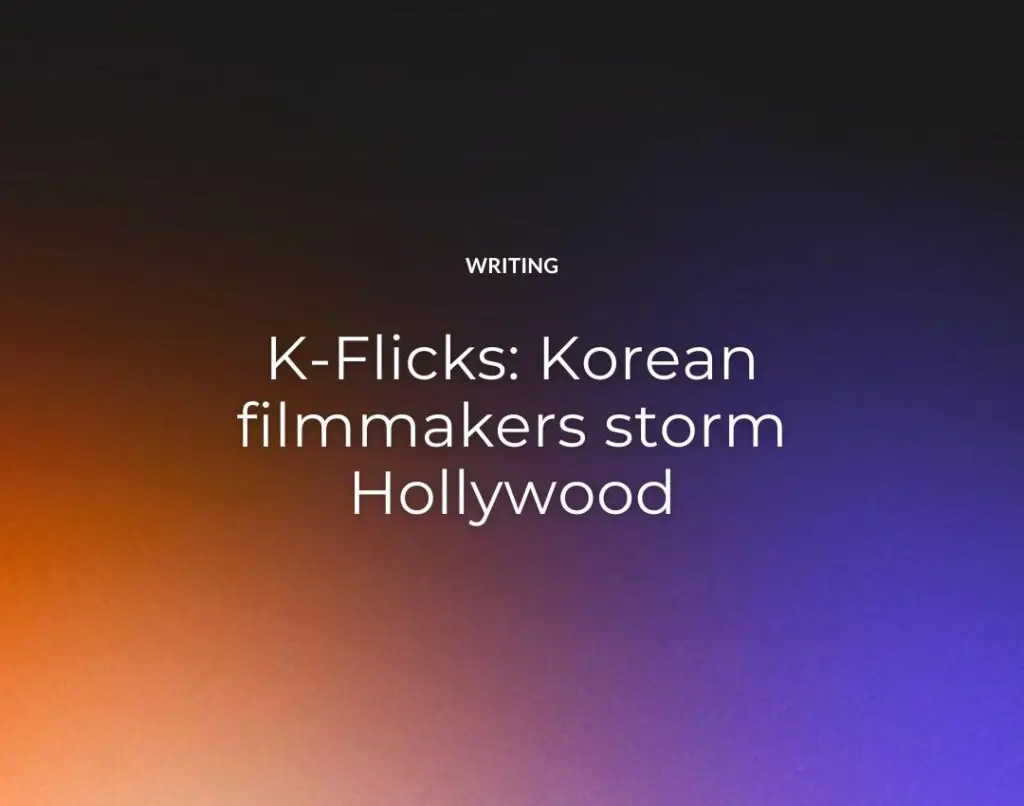By Geoffrey Cain
PRI’s The World
Aug 22, 2013
SEOUL, South Korea — If you’re a film buff, you may have heard of a Korean-made summer blockbuster that, strangely, hasn’t reached American shores quite yet.
Starring a line-up of famous Western actors, some critics say Snowpiercer — Korea’s most expensive film ever — represents a potential cultural landmark. Based on a French comic book, it covers a dystopia of post-apocalyptic survivors who, living on a train that travels around the world, rebel against their repressive overlords.
It’s a familiar moral tale about the fall of humankind. But look beyond storyline, and you’ll see that the film says a lot more about South Korea, a nation whose filmmakers are making a sudden splash in Hollywood this year. In fact, Snowpiercer’s renowned Korean director, Bong Joon-ho, is the third star in recent months to make his English debut, while breaking a number of box office records in his home country.
That is unexpected.
Twenty years ago, South Korean directors dealt with heavy-handed state censorship and worked under protectionist laws, insulating local artists from American competition. But an economic boom in the late 1990s fired up a generation of directors who, like the Hong Kong and Japanese filmmakers before them, have built up global recognition.
Controversially, Snowpiercer still doesn’t have an American release date. Despite rave reviews in Seoul, its massive American distributor has ordered the Korean studio to cut 20 minutes of footage, claiming that its complex plot needs tailoring to people in “Iowa and Oklahoma” (or, in other words, for us dull-witted Americans!).
As enthusiasts await the release, here are four Korean directors who are staking their claim in the West.
Bong Joon-ho
Snowpiercer may be the 44-year-old director’s English debut, but in South Korea he’s been long known for his genre-bending style and left-wing political commentary. In 2006, Bong made perhaps his most recognizable thriller, The Host. It’s about an American army doctor who discharges formaldehyde into Seoul’s Han River, unknowingly spawning a monster that terrorizes the city.
The film plays on Korea’s long-standing apprehension over the American military presence; in 2000, a military mortician was indeed sentenced for pouring the cancer-causing chemical down the drain. In 2009, Bong came back with a hit at Cannes, Mother, a mystery about a woman who must prove her disabled son’s innocence in a murder.
Park Chan-wook
Quentin Tarantino has sworn allegiance to this iconic (and iconoclastic) director who was among the first to popularize Korean cinema in the West. Park Chan-wook, 51, is the mind behind a twisted trilogy, Sympathy for Mr. Vengeance (2002), Oldboy (2003) and Sympathy for Lady Vengeance (2005), a line-up that addresses themes of revenge, madness and, more disturbingly, incest.
In March, Park brought more perversity to American shores with his thriller, Stoker, starring Nicole Kidman and Matthew Goode. It’s the story of a psychopath who becomes a caretaker to a devastated family. But be warned: some scenes will unsettle you, like when a young woman masturbates in the shower to the thought of a murder that just took place.
In Park’s films, characters suffer from depravity brought about by a thirst for vengeance. But he’s also dabbled in other areas, like the tragedy of national division. In 2000, his mystery JSA broke ground in the industry, depicting a secret friendship between South and North Korean soldiers near the demilitarized zone (DMZ). After several meetings, their camaraderie ended in an enigmatic murder and military confrontation.
Nowadays, Park tells GlobalPost that he’s working on a crowdsourced project with his brother, splicing together video submissions into a film about the vibrant everyday life of Seoul.
At the same time, Spike Lee is harking back to Oldboy in a remake due out in November. (This is reportedly not making Park happy.)
Kim Ki-duk
Park may love evocative themes, but the controversial auter Kim Ki-duk is even more gruesome. Last year, the art-house director released Pietà, the portrait of a debt collector in a gritty industrial town; it won the highest award at the Venice Film Festival.
The protagonist scours an impoverished neighborhood, doing whatever he can to get his boss’s money back, including grinding bones in machinery and throwing non-payers out the window. When a woman shows up at his door claiming to be his mother, he rapes her.
Yet unlike his peers, Kim hasn’t made a huge mark in North America, instead finding good reception (and controversy) in Europe. In 2000, the UK ratings board delayed the release of his film over a scene in which a frog is skinned alive. At home, critics say he hasn’t caught on with Seoul audiences in the same way he has overseas.
Recently, Kim had to cut three minutes of incest scenes at the urging of the government, which had banned his upcoming film, Moebius, now due out in September.
More from GlobalPost: North Korea agrees to family reunions with the South
Kim Ji-woon
This popular director, 49, offers a light-hearted breather from the debauchery and twisted sex of his colleagues. In fact, Kim Ji-woon has directed Arnold Schwarzenegger himself in this year’s action blockbuster The Last Stand, also starring Johnny Knoxville. This is Schwarzenegger’s first leading role since he stepped down as the governor of California, and he now plays a small-town Arizona sheriff on the hunt for a drug dealer en route to Mexico.
In his home country, Kim is similarly known his wide appeal. His 2008 cowboy adventure film, The Good, The Bad and The Weird, is a favorite of this correspondent, an Asian take on Clint Eastwood’s spaghetti Western, The Good, The Bad, and The Ugly.
But rather than follow a tranche of American cowboys, this time a trio of treasure hunters takes to Asia’s lesser-known wild west: the 1930s Gobi Desert of what is today Mongolia, depicted as a romantic land of thrill-seekers, swashbucklers and spies.
The article was originally published in PRI’s The World
See Also:
- China’s love affair with South Korea
- South Korean baseman calls African-American pitcher ‘too black’





